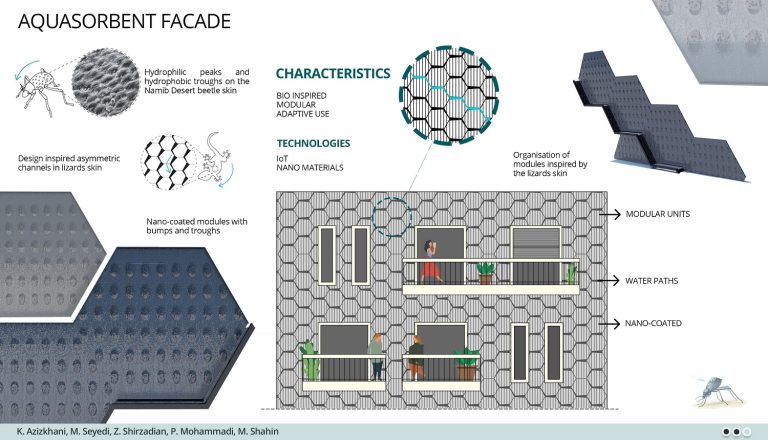Researchers from Techlab laboratory, based at Shiraz University in Iran, have won a £10,000 research prize to investigate how air humidity and rainfall can be used to aid indoor thermal comfort in arid regions, inspired by water absorption methods observed in the Namib desert beetle.
The Water Research prize is funded by GROHE and is part of the World Architecture Festival annual awards programme. This is the fourth time it has been awarded; other winners have included water filtration, generation and cooling systems in Peru, Brazil and Greece.
This year’s winning project, ‘Aquasorbant Façade’, was announced today (30 November) and Techlab laboratory presented the project as part of a virtual panel discussion on the Water Research Prize today at 13:00 – 14:00 (GMT) with panellists including Paul Finch, Director of World Architecture Festival, Jeremy Melvin, WAF Curator, Patrick Speck, Leader LIXIL Global Design, EMENA and Stefan Schmied, Leader, Business Unit Projects, LIXIL EMENA.
The winning project uses honeycomb-like modules with peaks and troughs to absorb and retain water molecules in the air, inspired by how air humidity is consumed by desert insects, flora and fauna through their ionic skin and body surfaces. The modules, also designed to best capture rainfall, will guide the water into vertical tanks embedded in the façade. Smart sensors, linked to the tanks, will monitor and record indoor temperature and humidity rates so water can be automatically distributed using cool-mist humidification systems when needed.
Researchers say the prize money will allow them to partner with other research divisions to research and experiment with the very latest digital fabrication methods, materials, and environmental sensors to progress the project. Although designed for regions where precipitation, underground water resources and running water supplies are hard to access, as water scarcity becomes a growing concern globally, its applications can extend to buildings in different climates around the world.


